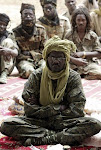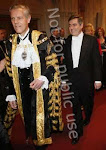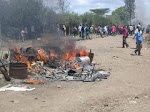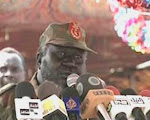The crisis in Kenya, which was caused by what the opposition there calls 'presidential election rigging', seems to be difficult to resolve. Because Kofi Annan, the former UN Secretary–General (SG), who was appointed by the African Union (AU) as its Special Envoy – charged with the task of mediating and reaching an agreement to end the crisis between the warring parties in Kenya – hinted that a deal for a coalition government between the warring parties was in the offing.
Annan stated on February 12th, 2008, that he had struck a deal between the government of Kenya and the Opposition. The deal, he said, is for both the opposition and the government to form a coalition care-taker government, which is supposed to prepare for election after two years. A coalition government is an open option when a country is in a crisis and right now we are faced with a serious political crisis. The two sides come together and commit to sort out issues such as constitutional reforms and then organise an election, Annan told Kenyan MPs during an informal sitting at Old Parliament Chambers, (http://politics.nationmedia.com/inner.asp?pcat=NEWS&cat=TOP&sid=1472).
The statement that Annan didn't influence any deal between the opposition and the Kenyan government was made by the Kenyan Minister of Justice, Martha Karua. She said that there is no such deal between her government and the opposition. She referred to Anan's statement as 'weakening the government side in the negotiation.' Kenya's Justice Minister, Martha Karua, leading the PNU negotiating team, accused Annan on Tuesday (February 12th, 2008) of weakening the government's negotiating position and causing it embarrassments in the ongoing mediation effort, which has moved to secret location, (http://www.africanews.com/site/list_messages/15762).
My team is alarmed at some serious inaccurate statement made by Your Excellency at the briefing of parliamentarians today. Namely you stated that 'the dialogue team had agreed to have a transitional government for two years after which we shall hold Presidential elections’ which position has not been discussed or agreed upon,” Karua told Annan, (http://politics.nationmedia.com/inner.asp?pcat=NEWS&cat=TOP&sid=1472).
What would such a contradiction really entail? In simple terms it would mean that the government would want to speak from a position of strength. In serious terms, it means that the crisis and that, which accompanies it, call it killing of innocent Kenyans, would continue unabated. If it continues, the government and the people of Kenya irrespective of their party affiliations will continue to suffer.
Why must a country like Kenya, admired by many developed and underdeveloped countries, including its own neighbours, continue to fight with itself? For whose interest is the fighting? Is it in the interest of its people or selfish individuals who want the presidency in Kenya regardless of whether or not blood spills?
The statement of the Kenyan Minister of Justice seems to have been made in a rush – before confirming from Annan what he really meant by what he said or it is simply adamancy – that which recognises strength as the only way to resolving the political crisis in Kenya. Annan said he was thinking loud, meaning that what he said could be a suggestion Kenyans need to look into and evaluate whether or not it would help them end the deadly political crisis.
However, one sincerely hopes that the Minister does not feel offended by this analysis. Because H.E. the Minister needs to know that her party is running the affairs of Kenya – a government which by itself is strength. In other words, whoever runs a government, will always be in a stronger position. Nonetheless, any ideas suggesting that the government will only be strong after crushing the opposition, and hence discuss with it from that position of strength, is far from the basis of peace-making.
Peace-making requires a heart that recognises own mistakes and accepts to conciliate, but never one that fuels conflict. It is the government that should have interest to make peace and not the opposition. The government is responsible for everybody in Kenya, including the opposition. The government cannot blame the opposition for the crisis taking place in Kenya; because it appeared that the government did not apply equal justice as it tried to address the serious accusation of vote rigging made by the opposition and supported by many, including the Chairman of the Electoral Commission of Kenya. Following three days of rioting and hundreds of deaths, Kenya's Elections Chief has admitted that he doesn't really know who won the election. "I do not know whether or not (Mwai) Kibaki won the election," Electoral Commission of Kenya Chairman, Samuel Kivuitu, told The Standard newspaper, (http://www.theage.com.au/news/world/kenya-poll-chief-admits-pressure/2008/01/02/1198949900272.html).
A just government should have formed a committee comprising of both the opposition and government officials to investigate the allegation of vote rigging. Should vote rigging be established, fresh presidential election should have been called for. This did not happen. Why, if someone is to ask very seriously? Is it because President Mwai Kibaki feels he may not win the election again? If the latter question is in the affirmative, then President Kibaki is unpopular and should honourably step down and allow the winner and his party to rule the country. That is the essence of democracy but not clinging on to power even through undemocratic means and the killing of innocent civilians in the name of democracy. Perhaps all these political intrigues put together are what have made the opposition feel cheated because it could not see the difference between a just government, willing to investigate the allegations of vote rigging and the ruling party, which is using government machinery to suppress the people's right to fair exercise of democracy.
The opposition in Kenya is calling for fresh Presidential election as a matter of principle. This is a clear message which the government is to address. Should government accept election rerun and the opposition loses for the second time, the opposition would have no right whatsoever to continue fanning the political crisis in Kenya. If they persist on refueling the current crisis, the government then must use its power of the law to arrest their leaders and charge them with treason against the Kenyan people.
The Kenyan government needs to be advised that it is fully responsible for the current situation in the country. Failing to resolve the current crisis as a government would in fact make it worse: it would amount to a crime against humanity. Unless both warring parties in Kenya have agreed to form a coalition government to prepare for fresh election in two years' time as hinted by Annan, the crisis in Kenya may not be nearing any end.
The Transition from one party rule to multi-party democracy in Kenya did not take the dimension of the current situation. President Daniel Toroitich arap-Moi did recognise then that any vote rigging would plunge Kenya into civil war and as such deployed troops to safeguard the interest of the Kenyan people. Thus, Kibaki did not find any resistance when taking over the reigns of power in Kenya. Why should Kibaki accept to work with greedy leaders, those who do not have the interest of Kenyans at heart except their personal interests? Does Kibaki want the world to believe that he is not democratic but Moi, who was regarded by the opposition, including Kibaki himself during the transformation of Kenya into a democracy as a dictator, has now emerged a better democrat in Kenya?
It should be noted that there is no amount of force that the government would employ to take away the rage of the opposition and their supporters. But dialogue, the path of which the warring parties in Kenya agreed to follow, under the mediation efforts of Annan, must continue no matter how long it takes. This would also require open hearts, the hearts that recognise the magnitude of the crisis and sincerely accept to conciliate.
The Kenyan government and people have assisted many countries in the East and Central African regions to settle their conflicts, including the very popular Sudan's Comprehensive Peace Agreement (CPA). The CPA especially had earned the Kenyan people and government a good reputation, a reputation that could have lined Kenya up for a possible winning of a Nobel Peace Prize had it not been for the current crisis, which has tarnished Kenya's good image regionally and internationally.
The Kenyan government and people need to give Annan all the assistance he needs to help them end the current political stalemate. Hatred developed from tribalism should really be put aside by the Kenyan people, especially the Kikuyu and the Luo tribes. Otherwise tribes that believe in their sizes and feel that they must suppress the rest of the country make true the Swiss people popular believe that a smaller tribe would rule with justice as compared to a bigger tribe or ethnic group. Take for instance the Swiss identity – made up of French, Italian, German and Rumantch speakers: the Swiss identity is diversity. We don't like each other so much, but have stayed together for centuries, (Conradin Perner (Kwacakworo), Seminar on Good Governance in South Sudan, Aberdare Country Club, Kenya, November 1st-3rd, 2000).
Annan stated on February 12th, 2008, that he had struck a deal between the government of Kenya and the Opposition. The deal, he said, is for both the opposition and the government to form a coalition care-taker government, which is supposed to prepare for election after two years. A coalition government is an open option when a country is in a crisis and right now we are faced with a serious political crisis. The two sides come together and commit to sort out issues such as constitutional reforms and then organise an election, Annan told Kenyan MPs during an informal sitting at Old Parliament Chambers, (http://politics.nationmedia.com/inner.asp?pcat=NEWS&cat=TOP&sid=1472).
The statement that Annan didn't influence any deal between the opposition and the Kenyan government was made by the Kenyan Minister of Justice, Martha Karua. She said that there is no such deal between her government and the opposition. She referred to Anan's statement as 'weakening the government side in the negotiation.' Kenya's Justice Minister, Martha Karua, leading the PNU negotiating team, accused Annan on Tuesday (February 12th, 2008) of weakening the government's negotiating position and causing it embarrassments in the ongoing mediation effort, which has moved to secret location, (http://www.africanews.com/site/list_messages/15762).
My team is alarmed at some serious inaccurate statement made by Your Excellency at the briefing of parliamentarians today. Namely you stated that 'the dialogue team had agreed to have a transitional government for two years after which we shall hold Presidential elections’ which position has not been discussed or agreed upon,” Karua told Annan, (http://politics.nationmedia.com/inner.asp?pcat=NEWS&cat=TOP&sid=1472).
What would such a contradiction really entail? In simple terms it would mean that the government would want to speak from a position of strength. In serious terms, it means that the crisis and that, which accompanies it, call it killing of innocent Kenyans, would continue unabated. If it continues, the government and the people of Kenya irrespective of their party affiliations will continue to suffer.
Why must a country like Kenya, admired by many developed and underdeveloped countries, including its own neighbours, continue to fight with itself? For whose interest is the fighting? Is it in the interest of its people or selfish individuals who want the presidency in Kenya regardless of whether or not blood spills?
The statement of the Kenyan Minister of Justice seems to have been made in a rush – before confirming from Annan what he really meant by what he said or it is simply adamancy – that which recognises strength as the only way to resolving the political crisis in Kenya. Annan said he was thinking loud, meaning that what he said could be a suggestion Kenyans need to look into and evaluate whether or not it would help them end the deadly political crisis.
However, one sincerely hopes that the Minister does not feel offended by this analysis. Because H.E. the Minister needs to know that her party is running the affairs of Kenya – a government which by itself is strength. In other words, whoever runs a government, will always be in a stronger position. Nonetheless, any ideas suggesting that the government will only be strong after crushing the opposition, and hence discuss with it from that position of strength, is far from the basis of peace-making.
Peace-making requires a heart that recognises own mistakes and accepts to conciliate, but never one that fuels conflict. It is the government that should have interest to make peace and not the opposition. The government is responsible for everybody in Kenya, including the opposition. The government cannot blame the opposition for the crisis taking place in Kenya; because it appeared that the government did not apply equal justice as it tried to address the serious accusation of vote rigging made by the opposition and supported by many, including the Chairman of the Electoral Commission of Kenya. Following three days of rioting and hundreds of deaths, Kenya's Elections Chief has admitted that he doesn't really know who won the election. "I do not know whether or not (Mwai) Kibaki won the election," Electoral Commission of Kenya Chairman, Samuel Kivuitu, told The Standard newspaper, (http://www.theage.com.au/news/world/kenya-poll-chief-admits-pressure/2008/01/02/1198949900272.html).
A just government should have formed a committee comprising of both the opposition and government officials to investigate the allegation of vote rigging. Should vote rigging be established, fresh presidential election should have been called for. This did not happen. Why, if someone is to ask very seriously? Is it because President Mwai Kibaki feels he may not win the election again? If the latter question is in the affirmative, then President Kibaki is unpopular and should honourably step down and allow the winner and his party to rule the country. That is the essence of democracy but not clinging on to power even through undemocratic means and the killing of innocent civilians in the name of democracy. Perhaps all these political intrigues put together are what have made the opposition feel cheated because it could not see the difference between a just government, willing to investigate the allegations of vote rigging and the ruling party, which is using government machinery to suppress the people's right to fair exercise of democracy.
The opposition in Kenya is calling for fresh Presidential election as a matter of principle. This is a clear message which the government is to address. Should government accept election rerun and the opposition loses for the second time, the opposition would have no right whatsoever to continue fanning the political crisis in Kenya. If they persist on refueling the current crisis, the government then must use its power of the law to arrest their leaders and charge them with treason against the Kenyan people.
The Kenyan government needs to be advised that it is fully responsible for the current situation in the country. Failing to resolve the current crisis as a government would in fact make it worse: it would amount to a crime against humanity. Unless both warring parties in Kenya have agreed to form a coalition government to prepare for fresh election in two years' time as hinted by Annan, the crisis in Kenya may not be nearing any end.
The Transition from one party rule to multi-party democracy in Kenya did not take the dimension of the current situation. President Daniel Toroitich arap-Moi did recognise then that any vote rigging would plunge Kenya into civil war and as such deployed troops to safeguard the interest of the Kenyan people. Thus, Kibaki did not find any resistance when taking over the reigns of power in Kenya. Why should Kibaki accept to work with greedy leaders, those who do not have the interest of Kenyans at heart except their personal interests? Does Kibaki want the world to believe that he is not democratic but Moi, who was regarded by the opposition, including Kibaki himself during the transformation of Kenya into a democracy as a dictator, has now emerged a better democrat in Kenya?
It should be noted that there is no amount of force that the government would employ to take away the rage of the opposition and their supporters. But dialogue, the path of which the warring parties in Kenya agreed to follow, under the mediation efforts of Annan, must continue no matter how long it takes. This would also require open hearts, the hearts that recognise the magnitude of the crisis and sincerely accept to conciliate.
The Kenyan government and people have assisted many countries in the East and Central African regions to settle their conflicts, including the very popular Sudan's Comprehensive Peace Agreement (CPA). The CPA especially had earned the Kenyan people and government a good reputation, a reputation that could have lined Kenya up for a possible winning of a Nobel Peace Prize had it not been for the current crisis, which has tarnished Kenya's good image regionally and internationally.
The Kenyan government and people need to give Annan all the assistance he needs to help them end the current political stalemate. Hatred developed from tribalism should really be put aside by the Kenyan people, especially the Kikuyu and the Luo tribes. Otherwise tribes that believe in their sizes and feel that they must suppress the rest of the country make true the Swiss people popular believe that a smaller tribe would rule with justice as compared to a bigger tribe or ethnic group. Take for instance the Swiss identity – made up of French, Italian, German and Rumantch speakers: the Swiss identity is diversity. We don't like each other so much, but have stayed together for centuries, (Conradin Perner (Kwacakworo), Seminar on Good Governance in South Sudan, Aberdare Country Club, Kenya, November 1st-3rd, 2000).







No comments:
Post a Comment